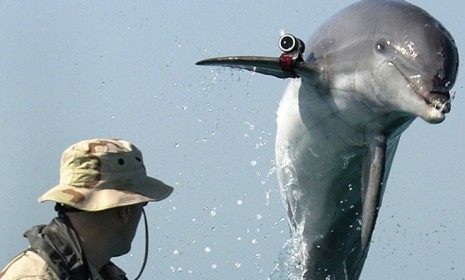Bomb-detecting dolphins: The Navy's secret weapon against Iran?
Iran is threatening to block a key oil tanker route — and brainy marine mammals may be the U.S. military's best hope of stopping Tehran

A free daily email with the biggest news stories of the day – and the best features from TheWeek.com
You are now subscribed
Your newsletter sign-up was successful
Iran's threat to block the Strait or Hormuz, the Persian Gulf passage through which about one-fifth of the world's oil shipments pass, has ratcheted up tensions with the U.S., prompting tough talk and a rare direct letter from the U.S. to Iran's government. Iran could block the strait, too, U.S. military officials say, either by attacking tankers with small, fast torpedo boats or laying mines. But if Iran mines the Persian Gulf, retired U.S. Adm. Tim Keating tells NPR, don't worry, because "we've got dolphins." Yes, mine-detecting dolphins may be America's secret to keeping the world's oil supply flowing. Here, a guide to the U.S. military's marine mammals:
How do dolphins clear mines?
They don't — at least not by themselves — but they are really good at finding mines and marking their location for Navy divers to destroy. "They are astounding in their ability to detect underwater objects," says Keating. Dolphins have an amazing ability to differentiate between natural and manmade objects — say a BB and a kernel of corn, from 50 feet away — using their natural sonar. When they find a mine, they drop off a floating marker or acoustic transponder so humans can find it.
The Week
Escape your echo chamber. Get the facts behind the news, plus analysis from multiple perspectives.

Sign up for The Week's Free Newsletters
From our morning news briefing to a weekly Good News Newsletter, get the best of The Week delivered directly to your inbox.
From our morning news briefing to a weekly Good News Newsletter, get the best of The Week delivered directly to your inbox.
How do we train these dolphins?
Not unlike you would train a hunting dog, or a police K9 unit: Navy trainers in San Diego reward the dolphins with fish or other treats after they complete assigned tasks.
Isn't this dangerous?
The Navy says the dolphins never get close enough to the mines to set them off. But animal-rights proponents aren't convinced, pointing out that porpoises are certainly large enough to accidentally explode a mine — and themselves. And "there are no numbers available on dolphin battlefield fatalities," says Jamie Condliffe at Gizmodo. Working for the U.S. military poses other risks for the marine mammals, says John Hudson at The Atlantic Wire. Iran can't tell a military dolphin from a wild one, so Iranian soldiers could indiscriminately attack all dolphins they see.
A free daily email with the biggest news stories of the day – and the best features from TheWeek.com
Are mine-hunting dolphins a new idea?
No. The U.S. Navy Marine Mammal Program has been training dolphins and sea lions since the 1960s, and mine-detecting dolphins have been used in at least two previous conflicts, most recently the 2003 invasion of Iraq, when eight Navy dolphins helped clear more than 100 mines and underwater booby traps placed by Saddam Hussein's forces, according to Smithsonian Magazine. The U.S. only declassified the Navy's sea mammal program in the early 1990s, and maintains that its dolphins are used only for defensive, non-combat operations like detecting and marking mines and enemy swimmers, and quickly identifying safe passage for landing troops.
Sources: ABC News, Atlantic Wire, BBC News, Gizmodo, Green Prophet, NPR, Smithsonian, Wikipedia
-
 Gwen John: Strange Beauties – a ‘superb’ retrospective
Gwen John: Strange Beauties – a ‘superb’ retrospectiveThe Week Recommends ‘Daunting’ show at the National Museum Cardiff plunges viewers into the Welsh artist’s ‘spiritual, austere existence’
-
 Should the EU and UK join Trump’s board of peace?
Should the EU and UK join Trump’s board of peace?Today's Big Question After rushing to praise the initiative European leaders are now alarmed
-
 Antonia Romeo and Whitehall’s women problem
Antonia Romeo and Whitehall’s women problemThe Explainer Before her appointment as cabinet secretary, commentators said hostile briefings and vetting concerns were evidence of ‘sexist, misogynistic culture’ in No. 10